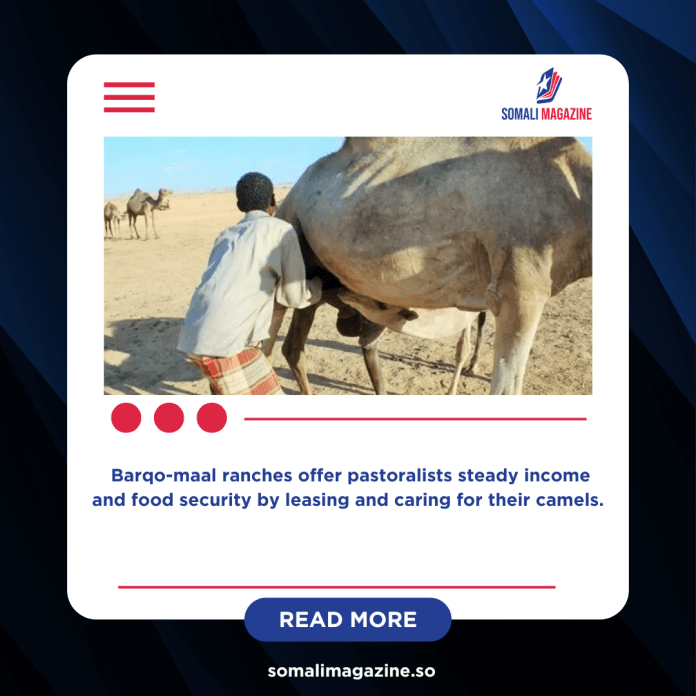Facebook Twitter (X) Instagram Somali Magazine - People's Magazine
Pastoralist families in central Somalia’s Mudug region, who had been on the verge of abandoning livestock after years of severe drought, are now finding renewed hope through a milk trading cooperative that keeps camels on urban ranches. The initiative, run by Barqo-maal ranches, allows herders to lease out their camels in exchange for regular monthly income while ensuring the animals receive better care.
One of the herders, 50-year-old Saleyman Yasin Nur, lost nearly his entire herd—170 goats and 41 camels—over the past two years due to drought. Left with only 30 goats and eight camels, he was forced to depend on relatives and had debts of $700 for food and other basics. But after seeing his neighbors benefit from the Barqo-maal cooperative, he decided to lease five of his lactating camels to the ranch near Harfo. Today, he earns a steady $150 a month, enough to feed his family, settle debts, and even plan for the future.
“Life today is far better than before. Now we eat three meals a day, and I have an income I can rely on. Before, we were always in hardship and worried about food. God opened this new path for us,” Saleyman said. His camels are producing more milk under the ranch’s improved care, and he no longer has to walk long distances to sell at low prices in town. With the new income, he hopes to send five of his children to school and lease out more camels to boost his earnings.
Another pastoralist, Guled Mohamed Ali, is supporting his family of nine in the same way. He leases six camels to Barqo-maal, earning $25 per camel each month since May. Before, he often struggled to provide even one meal a day for his family as drought and fodder shortages left his animals weak and unproductive. “Now we have three meals a day, and much of the stress about food and water is gone,” Guled said.
Guled, who still keeps 30 goats and 11 camels at home, had fallen into $600 of debt with local shopkeepers after years of hardship. Without animals to sell, he had no way to repay it. Thanks to the income from Barqo-maal, he is now slowly paying it back while also buying veterinary drugs and water to keep his remaining animals alive.
The Barqo-maal cooperative started as a solution for milk traders who had lost their own camels to drought, which created shortages in towns like Galkayo, Ba’adweyn, and Harfo. Instead of buying new camels, which is costly, they began leasing lactating camels from herders who were struggling to survive. The arrangement proved beneficial for both sides: traders gained a steady milk supply while herders earned monthly income and saw their animals survive under better care.
Abdimaliq Hassan Jimale, who manages a Barqo-maal ranch outside Galkayo, explained that they focus on helping families most affected by drought—those left with only a few animals. The ranch takes around five lactating camels from each family, cares for them, and rotates them once the milking period ends. “Economically, the families benefit, the animals survive and produce more milk, and we traders also profit. Both sides gain,” he said.
For families who once spent endless time and effort looking for water and pasture, often with little reward, this model has brought new stability. It has turned uncertainty into a source of steady income, helping them cope with drought while keeping their traditional way of life alive.

